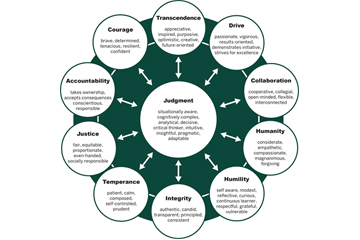Interviewing for Character, Part 2 – A Practical Approach
October 8, 2018
 By: Dennis Ensing
By: Dennis Ensing
In a previous blog post, we discussed the Vocabulary and Methodology for determining if an individual has “character”, we suggest you read this post first to familiarize yourself with this concept.
How to Uncover Passion
One of our SWO Angels members has a particularly good question that can uncover a lot in a conversation. He asks: “Why did you start this venture?” For him to be interested in investing, the answer must reveal a passion for an outcome that is beyond the entrepreneur’s natural ability to solve. Simple monetary or wealth objectives are uninteresting to this member. There is power in “Why?” questions!
Like this question, we should consider other possible red flags we want to identify in an entrepreneur. For example, since humility is a huge engine for learning, the absence of it as described above is something we always look for. We assess it in other ways, like “Is this founder coachable?”
But do they also understand their blind spots? What gets under their skin? Dr. Crossan lit up when she said that humility and courage together with self-awareness is gold! Our questions/conversation can bring this out when delving into founders’ experiences. When she brought this up, I immediately thought about both my observations and commentaries on Alex Ovechkin’s performance in the Capital’s recent Stanley Cup playoff run. Clearly he had made a significant transition from “me” to “we”. Questions like “Who are you playing for?” and “Whose back do you have?” would have definitely created an insightful conversation.
Can Character be Developed?
Ovechkin’s apparent transformation highlights something else that Dr. Crossan and I discussed. Character can be developed. It is not something that someone will have or not have, but deficiencies identified can be worked on. I briefly alluded to this earlier in this article when I noted it is easier to recognize the Leadership Virtues in others when we are working on them ourselves. Dr. Crossan references a famous saying that illustrates this point rather well:
“Watch your thoughts, for they become words. Watch your words, for they become actions. Watch your actions, for they become habits. Watch your habits, for they become character. Watch your character, for it becomes your destiny” (author unknown).[1]
We also reviewed another caution Dr. Crossan makes and discusses in more detail in her research. Virtues become vices in their excess or deficiency. Courage in its excess is recklessness while in its deficiency it is cowardice. Collaboration in excess, ungoverned by judgment as to when it will result in benefits, leads to numerous unproductive meetings and organizational inefficiency. But without it, teamwork is difficult or impossible. Too much humility may lead followers to question the leader’s toughness, resulting in a lack of confidence. But without it, leaders make ill-advised decisions and are unable to learn. [2]
Avoid Tunnel Vision
So, Dr. Crossan urged that we must be careful to cover the character wheel and pay attention to areas that we didn’t cover. We must not look only at certain pieces – especially those that are fascinating us – and miss seeing the big picture. Going back to something we discussed earlier in our get together, she also said that when we are working on our own character we should become more captivated by the pieces that are less obvious, but strikingly strong.

It may take a few – or even several – conversations with prospective investee founders to discover their character, but these can be woven into our normal due diligence process. Dr. Crossan advised not to worry about being too personal and definitely not to shy away from delving into the “Who am I?” category. We will accomplish the most when we lead these discovery conversations with humanity and downplay the roles/identities that are expected.
Involve the Entrepreneurs in the Discussion
Finally, we discussed that there would likely be value in providing our candidates with the “Character Matters” article [3] so that our conversations and vocabulary have context and in turn foster better leadership – both decision making and management – inside the ventures in which we invest.
[1] Ibid.
[2] Ibid.
[3] “Character matters: Character dimensions’ impact on leader performance and outcomes”, Gerard Seijts, Jeffrey Gandz, Mary Crossan, Mark Reno, Ivey Business School, Western University, 1255 Western Road London, Ontario, Canada
